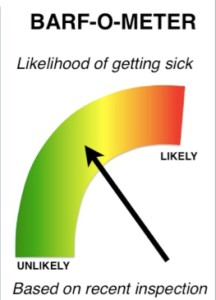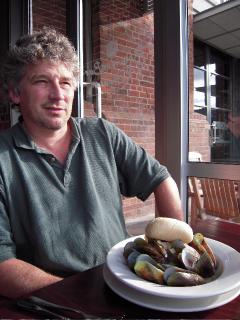I call Andrew McKenzie a friend, and he calls me a reprobate.
Fair enough. He certainly dresses better.
 And has more tolerance for meetings.
And has more tolerance for meetings.
Business Day in New Zealand has a profile of the 62-year-old retiring Food Safety Authority chief executive with all the old stories, probably told through certain filters.
What I remember best – through the fog of good scotch – was an outstanding lamb dinner a pregnant Amy and I had with Andrew and his wife at their home overlooking Wellington in 2008, followed by an All Blacks rugby match on the tube.
Andrew McKenzie could justly claim the title of the father of modern meat inspection conferred on him by a speaker at a European conference recently.
The retiring chief executive of the Food Safety Authority was a lowly government official in the mid-80s when he had the temerity to challenge the European-imposed rules governing meat inspection.
The actions that flowed from this led to savings of many millions of dollars to the meat industry and freed up international trade.
He encountered his first silly rule as a young Agriculture Ministry meat inspector in the mid-70s. It required the inspectors who worked with meat workers on the slaughter chain to inspect the heads of all sheep to look for signs of disease.
Dr McKenzie knew this was unnecessary because there were no signs of disease on a head that couldn’t already be seen in the normal inspection of the carcass, but it was demanded by Britain as a requirement of accepting our exports.
The head had to be skinned, adding huge cost to sheep processing. Three or four extra butchers had to be employed on each chain, as well as one extra meat inspector. Ten years later he was in a position to do something about it.
He convinced the meat companies to run trials. In one day 325,000 animals were killed. No signs of disease were found on the heads that were not already uncovered by inspection of the rest of the carcass.
 He presented the results to the British authorities and they agreed to change the rules.
He presented the results to the British authorities and they agreed to change the rules.
It meant the loss of up to 500 seasonal jobs, but the industry estimated its savings at $10 million-$12m a year.
He went to the European Union headquarters and argued that many of the rules didn’t make sense in the New Zealand context. "They asked me to list them. Three days later I came back with 200 examples. When I flopped this on the table, they said `Ah jeez, this is a bit hard’."
The result was an "equivalency" agreement between Europe and New Zealand.
"That agrees there’s a bunch of basic things you need to do to make a difference to public and animal health, but there’s also others that are just good meat manufacturing and hygiene practice and they can vary," he says.
"Since then our relationship has gone along really well."
The agreement cleared the way for trade and was used as a template by the United States and Canada.
Crucial to the ongoing success of the agreement, and those that followed, has been New Zealand’s reputation for integrity and honesty in international trade.
"We’ve been scrupulously honest and people can rely on our word," Dr McKenzie says.
"And we’re pretty good thinkers – putting new ideas on the table, and taking a lot of their ideas, building on them, trialling them, modifying them and feeding them back into the system."
That they are, as Katie has just returned from a year working with NZFSA, helping develop a national restaurant inspection disclosure system.
 The Food Safety and Assurance Advisory Council was one of 29 recommendations from the Government Inquiry into the Whey Protein Concentrate Contamination Incident released in December last year, Food Safety Minister Nikki Kaye said Wednesday.
The Food Safety and Assurance Advisory Council was one of 29 recommendations from the Government Inquiry into the Whey Protein Concentrate Contamination Incident released in December last year, Food Safety Minister Nikki Kaye said Wednesday.
.jpg)

.jpg) line with other developed countries, by shifting from an inspection-based system to a risk-based approach.
line with other developed countries, by shifting from an inspection-based system to a risk-based approach. And has more tolerance for meetings.
And has more tolerance for meetings. He presented the results to the British authorities and they agreed to change the rules.
He presented the results to the British authorities and they agreed to change the rules. And every time, Chapman or I will walk the person through the limitations with testing, especially in fresh produce.
And every time, Chapman or I will walk the person through the limitations with testing, especially in fresh produce.  But some are just dumb, and it’s good to see the science types in New Zealand calling out some BS.
But some are just dumb, and it’s good to see the science types in New Zealand calling out some BS..jpg) “
“.jpg) “Partially defrosted turkeys are another common festive food safety blunder.”
“Partially defrosted turkeys are another common festive food safety blunder.”.jpg) “The Agency has been given an award by the Plain English Campaign for a leaflet advising the over 60s about food safety and the food poisoning bug listeria. Food safety and healthy eating messages are often based on complicated science, but the Agency strives to make these messages as accessible to as many people as possible. We are therefore pleased that these efforts have been recognised by our partners and by the Plain English Campaign.”
“The Agency has been given an award by the Plain English Campaign for a leaflet advising the over 60s about food safety and the food poisoning bug listeria. Food safety and healthy eating messages are often based on complicated science, but the Agency strives to make these messages as accessible to as many people as possible. We are therefore pleased that these efforts have been recognised by our partners and by the Plain English Campaign.” MAF Biosecurity New Zealand (MAFBNZ) and the New Zealand Food Safety Authority (NZFSA)
MAF Biosecurity New Zealand (MAFBNZ) and the New Zealand Food Safety Authority (NZFSA)